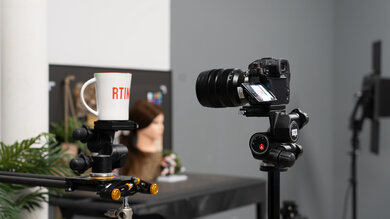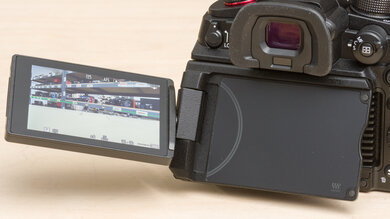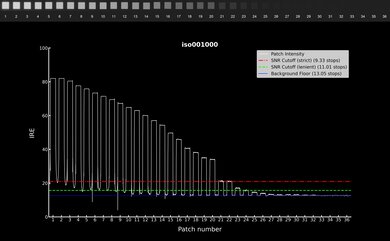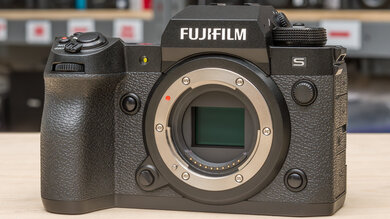
Once reserved primarily for professional cameras, 4k recording capability has become the baseline for what modern still cameras can do in video. While dedicated cinema cameras are still king for videography and filmmaking, they can also be very expensive, and you can still get excellent 4k video performance out of more affordable mirrorless or DSLR cameras. For that reason, most of our picks are hybrid photo/video cameras. These days, even more affordable entry-level models come with video features that feel advanced compared to cameras from five to ten years ago, making it easier than ever to pick up a camera and start recording.
We've bought and tested over 110 cameras in our lab, and below, you'll find our top 4k camera recommendations. If you're looking more specifically for a vlogging camera, you can also check out our picks for the best cameras for vlogging. Or, if you want something light enough to keep up with fast action, you can try the best video camera for sports.
-
Best 4k Camera
Travel Photography7.6Landscape Photography8.0Sport & Wildlife Photography7.9Vlogging7.2Studio Video9.1Action Video6.6Performance Usages: Raw Photo7.8The Panasonic LUMIX GH7 isn't just the best 4k video camera we've tested, it's one of the best video cameras we've tested, period. While it has advanced features like internal 6k RAW recording, those working in a 4k timeline will get oversampled 4k recording at up to 120 fps—with autofocus and no crop. The camera is also aimed squarely at videographers, with a tilting/fully articulating screen, full-sized HDMI port, CFexpress card slot, class-leading in-body image stabilization (IBIS), and a built-in fan with heat vents to prevent overheating. Though its Micro Four Thirds (MFT) sensor doesn't have the best noise handling, the camera's DR Boost function allows for excellent dynamic range, and rolling shutter is very manageable. All in all, it's a fantastic choice for high-level 4k video work.
If the price, however, is a little steep, the Panasonic LUMIX S5 II is a cheaper camera body that offers a ton of value for its price. Its full-frame sensor is well-suited to low-light situations, and it can record in 4k at up to 60 fps and supports a wide range of recording formats and codecs. However, it doesn't offer RAW video output or higher-quality ProRes formats out of the box, like the GH7 does.
-
Best 4k Camera For Fast Action
Travel Photography8.0Landscape Photography8.0Sport & Wildlife Photography8.5Vlogging7.2Studio Video8.7Action Video6.8Performance Usages: Raw Photo7.8If you tend to record a lot of high-speed action video, the Fujifilm X-H2S is one of the best options. It's well-suited to anything requiring sweeping panning shots thanks to its stacked APS-C sensor, which keeps rolling shutter distortion to a minimum. On top of that, it can record 4k video at up to 60 fps without a crop and up to 120 fps in its slow-motion recording mode. Its 4k video is oversampled from the full 6.2k resolution of its sensor, resulting in excellent overall quality, and if you need it, it also supports 6.2k open gate recording.
Beyond that, it comes with IBIS, a sturdy weather-sealed body, a CFexpress card slot, and a full-sized HDMI port to connect an external recorder. But with internal 10-bit recording in F-Log 2, you'll get more dynamic range and plenty of leeway to color-grade your footage even without an external recorder. The camera even supports ProRes formats internally for less compressed, higher-quality video files. All in all, this is a remarkably capable camera for 4k video work.
-
Best Mid-Range 4k Camera
Travel Photography8.3Landscape Photography8.2Sport & Wildlife Photography8.3Vlogging7.8Studio Video8.3Action Video7.6Performance Usages: Raw Photo7.9The Sony α6700 is an impressive hybrid camera from Sony's APS-C lineup. It has some of the most advanced 4k video features of any camera in its class, with 4k recording at up to 120 fps, though with a notable crop, so you can capture high-quality slow-mo footage with ease. It also features IBIS, a sturdy weather-sealed construction, and one of the best autofocus systems on the market, not to mention internal 10-bit recording and Log format support for more advanced video shooters.
Another excellent choice at this price point is the Fujifilm X-S20. Like the α6700, it has features like IBIS and internal 10-bit Log recording, along with the option to record in 6.2k open gate, giving you more leeway to crop into different aspect ratios. However, its autofocus system isn't as reliable or accurate as the AF on the α6700, and it has fewer frame rate options in 4k, maxing out at 60 fps.
-
Best Entry-Level 4k Camera
Travel Photography8.3Landscape Photography8.0Sport & Wildlife Photography8.2Vlogging8.5Studio Video8.6Action Video5.8Performance Usages: Raw Photo7.7If you want something a bit more basic than the picks above, the Sony ZV-E10 II is the best entry-level model we've tested for 4k video recording. With an APS-C sensor and a relatively compact vlog-centric design, the ZV-E10 II is a beginner-friendly video camera that offers a lot of bang for its buck.
It has excellent internal recording capabilities for its class, with more advanced features like Log profiles and 10-bit color depth, as well as 4k recording at up to 60 fps. On top of that, it supports slow-motion recording at up to 120 fps in 4k, making it versatile for a wide range of video styles. Its autofocus system also performs remarkably well in video, and video quality is great overall. The biggest downside is a lack of in-body image stabilization. If you can find one used, the Fujifilm X-S10 is a good, if slightly dated, alternative that features IBIS. That said, it has fewer frame rate options and can't record 10-bit video internally.
-
Best Budget 4k Camera
Travel Photography8.2Landscape Photography8.1Sport & Wildlife Photography7.3Vlogging8.7Studio Video8.2Action Video4.8Performance Usages: Raw Photo8.0Most of our picks above are more advanced models, but you don't necessarily need to spend a fortune to shoot high-quality 4k video. The Sony ZV-E10, the predecessor to our entry-level pick above, is the best 4k video camera for those on a tighter budget, as it has a lot of the same features as its successor at a lower price. The biggest drawbacks are a lack of 10-bit recording and fewer frame rate options in 4k, maxing out at 30 fps, but at this price point, you won't find a better video or vlog option.
Unlike higher-end models, there's no built-in stabilization here, and the camera's vlogging-centric design means there's no viewfinder. However, the camera has a fully articulated screen and simple, accessible controls that are perfect for beginner shooters. Plus, it has a ton of customization options, a great battery life, and no recording time limit. Ultimately, if you want to shoot 4k videos or vlogs without breaking the bank, the ZV-E10 is the best choice.
-
Best 4k Point-And-Shoot Camera
Travel Photography7.4Landscape Photography7.2Sport & Wildlife Photography7.3Vlogging7.9Studio Video7.0Action Video5.2Performance Usages: Raw Photo6.5If you'd prefer something smaller and easier to carry, the Sony ZV-1 is basically a point-and-shoot version of the Sony ZV-E10. It's less versatile since it uses a fixed lens and has a smaller 1-inch type sensor, but it's the best option if you're looking for a compact video camera. The newer Sony ZV-1 II features a wider-angle lens; however, it's more expensive and lacks optical stabilization, so unless you need a wide-angle field of view for vlogs, the ZV-1 is a better-value option.
This is one of the rare point-and-shoot cameras with a fully articulated screen, so you can monitor yourself while recording. It has an excellent autofocus system, too, and it can record 4k video at up to 30 fps, though with a slight crop. The biggest trade-off here is battery life—a smaller camera means a smaller battery and worse battery performance. Therefore, it's capped to a very short five-minute recording limit in 4k to prevent overheating (by default; you can change this in the settings if you wish). Though it's prone to overheating if you record continuously, this is still a great option if you stick to shorter takes.
Notable Mentions
- Canon EOS R6 Mark II:
The Canon EOS R6 Mark II is an excellent full-frame enthusiast camera, with 4k recording at up to 60 fps without a crop. However, the Panasonic LUMIX GH7 offers more recording format and frame rate options, as well as having better ergonomics for video.
See our review - Nikon Z 6III:
The Nikon Z 6III is one of the best full-frame options for video. Like the Panasonic LUMIX GH7, it can record RAW video internally and records 4k at 120 fps (though with a heavy crop). That said, the Panasonic is a bit cheaper, with better ergonomics for video, and uses more portable MFT lenses.
See our review - Panasonic LUMIX GH5 II:
The Panasonic LUMIX GH5 II is a great upper mid-range choice with a Micro Four Thirds sensor. It's a little more advanced, with more recording format options than the Sony α6700 and videography features like a full-sized HDMI port. However, its autofocus isn't nearly as reliable.
See our review - Sony α7 IV:
The Sony α7 IV is another great hybrid full-frame camera, with excellent 4k video features, including 4k at 60 fps (with a crop) and seamless autofocus. However, the Panasonic LUMIX GH7 is more videography-oriented, with more advanced recording format and codec options.
See our review - Sony ZV-E1:
The Sony ZV-E1 is an excellent full-frame option with a sensor that's particularly well-suited to low light. However, its compact vlogging-centric design causes more overheating than cameras like the Panasonic LUMIX GH7 or Panasonic LUMIX S5 II.
See our review
Recent Updates
-
We replaced the Canon EOS R10 with the Sony ZV-E10 II as the entry-level pick and renamed the Sony ZV-1 as the 'Best 4k Point-And-Shoot Camera.'
-
Oct 02, 2024 : We replaced the Panasonic LUMIX GH7 with the Panasonic LUMIX S5 II as the top pick because of its more advanced video features and moved the Sony α7 IV to the Notable Mentions. We also removed the Fujifilm X-T4 from the Notable Mentions and added the Nikon Z 6III.
-
Jul 05, 2024 : We renamed the Fujifilm X-H2S from the 'Best APS-C 4k Camera' to the 'Best 4k Camera For Fast Action' to better represent its value for users.
-
May 07, 2024 : We switched around the Panasonic LUMIX S5 II and the Fujifilm X-H2S, making the Panasonic the top pick and the Fujifilm our APS-C pick.
-
Mar 15, 2024 : We've replaced the Fujifilm X-S10 with the Canon EOS R10 because it has slightly better video specs and renamed it to 'Best Entry-Level 4k Camera.' We've also shifted the Sony α6700 from 'Best Upper Mid-Range 4k Camera' to 'Best Mid-Range 4k Camera.'
All Reviews
Our recommendations above are what we think are currently the best 4k cameras for most people to buy, according to their needs. We factor in the price, feedback from our visitors, and availability (no cameras that are difficult to find or almost out of stock in the U.S.).
If you would like to choose for yourself, here's the list of all our reviews for 4k-capable cameras. Be careful not to get caught up in the details. There is no single perfect camera. Personal taste, preference, and shooting habits will matter more in your selection.
Comments
Best 4k Cameras: Main Discussion
What do you think of our picks? Let us know below.
Looking for a personalized buying recommendation from the RTINGS.com experts? Insiders have direct access to buying advice on our insider forum.
Update: We replaced the Canon EOS R10 with the Sony ZV-E10 II as the entry-level pick and renamed the Sony ZV-1 as the ‘Best 4k Point-And-Shoot Camera.’
What do you think of these changes? Let us know






































































